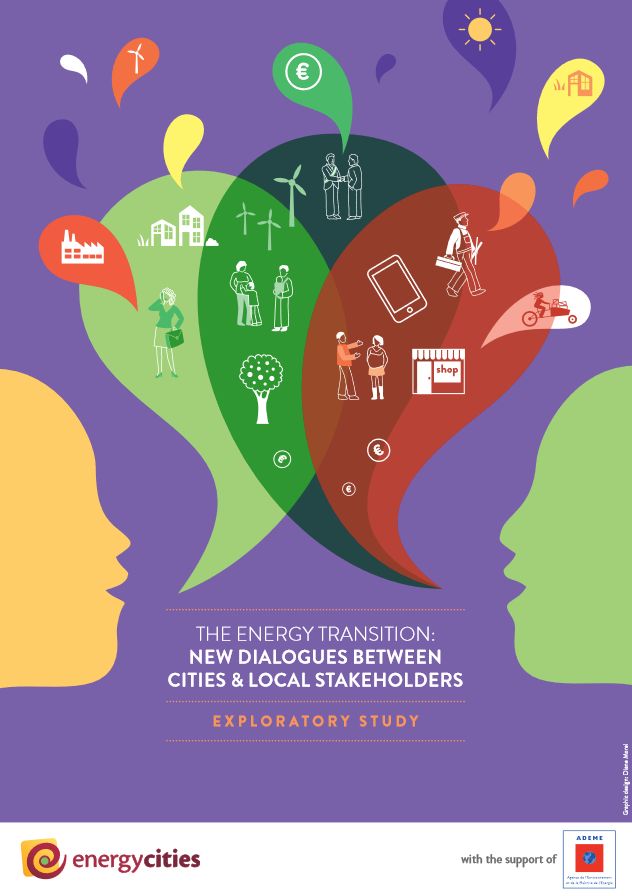The energy transition : new dialogues between cities & local stakeholders
Exploratory study

Local authorities have a key role to play in energy and climate policies and in the energy transition towards a low carbon, energy efficient and sustainable model. They cannot, however, act alone for they of ten control only a small fraction of local greenhouse gas emissions, a fraction which rarely exceeds 25%. Relying on the involvement of local stakeholders is therefore essential. It is also a guarantee of innovation and ambitious initiatives.
How to stimulate stakeholders’ involvement?
In recent years, a number of initiatives led by citizens, economic players and other local stakeholders have contributed to the energy transition of territories. These initiatives are based on empowerment as well as on innovative tools and approaches such as a social and inclusive economy, stakeholders’ engagement, crowdfunding, community energy cooperatives and fab labs.
Energy transition initiatives, exist in all areas, led by individual stakeholders from the public or private sector, whether or not for profit. This raises a number of questions: What can be done to multiply existing local stakeholders’ innovative initiatives on a large scale? How can an emulation and snowball effect be created to spread the energy transition to all the stakeholders?
Driving change through ambitious partnerships, networks and alliances
“Delft energy neutral 2050” vision :
The city of Delft (100,000 inhabitants) has had an active energy policy since the 1990s, resulting in a 15% greenhouse gas emission reduction between 1990 and 2012. In 2011, the municipality took a big step by adopting the ambition to become energy neutral by 2050 and decided to reduce GHG emissions by 35% between 2012 and 2020 to achieve this aim.
This decision resulted in the need for a radically different approach. The municipality had a direct influence on only 2% of the emissions generated in its territory, i.e. the emissions generated by municipal buildings and facilities. The city of Delft opted for an innovative approach, moving from a role of initiative instigator to one of facilitator after noticing that an increasing number of initiatives in favour of sustainable development had been launched by local businesses and citizens. While increasing numbers of citizens felt the need to reduce their dependency on large utility companies by generating their own energy, businesses were seeking to reduce fossil energy costs and an increasing number were paying growing attention to their environmental footprint. A genuine trend in favour of a “green economy” based on innovative solutions and the responsible use of available resources was therefore emerging3.
The municipality thus decided to encourage these committed local players to take on more responsibilities, by giving them enhanced powers over the interpretation of the targets and over the means to achieve them.
Encouraging citizen participation
Plymouth Energy Community :
In Plymouth (261,500 inhabitants), in the southwest of England, the city council launched an innovative project aimed at encouraging community involvement in local energy policy in 2013. Concerned with fuel poverty and greenhouse gas emissions, the city council decided to give more decision-making power to the community by establishing a community benefit society dedicated to energy, thus transforming the way Plymouth citizens buy, use and generate power.
The initiative resulted from strong political will and was part of the 100 pledges of Councillor Tudor Evans, themed around 10 priority areas focusing on: the economy and jobs, tackling crime, supporting young people, the environment, transport, housing, sport and culture, the city’s image, the inhabitants’ well-being and transparency of local government. All these pledges give backing to the establishment of an organisation that provides services, empowers local citizens and stimulates the economy.
